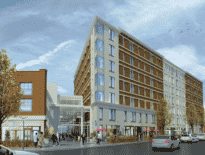A plan to reverse exclusionary zoning in Boston and address discriminatory housing practices needs only Mayor Marty Walsh’s already-pledged signature to take effect, after receiving a favorable vote Wednesday from the Boston Zoning Commission.
The zoning code change, approved in December by the city council and Boston Planning & Development Agency’s board, stems from a fair housing rule issued in 2015 by President Barack Obama that required cities to examine barriers to fair housing. City officials, pushed by District 1 City Councilor Lydia Edwards and District 8 City Councilor Kenzie Bok, created a plan to rectify fair housing practices even though President Donald Trump repealed the 2015 rule.
Under the code change, the city will require certain proposed development projects “to consider impacts on area residents historically discriminated against so that steps can be taken to reduce those impacts, provide new housing opportunities, and address past histories of exclusion,” according to the BPDA.
The measure is already influencing projects in the city, most notably Accordia Partners’ Dorchester Bay City project where the developer plans to fund down payments for first-time homebuyers and other activities to prevent displacement in the neighborhoods near the site.
In a statement, Walsh said he would sign the amendment and predicted the changes could make Boston a national leader on fair housing practices. The mayor also thanked Edwards and Bok for their work on the matter.
“Knowing that zoning originated across America a century ago as a legal basis for racial exclusion, it is so important that we are taking this step today to reverse that tide and use zoning as a proactive tool for inclusion,” said Bok. “Through the analysis and intervention measures that the amendment requires, Boston can begin to more effectively guard against displacement while also creating affordable housing in areas that have historically excluded people of color, particularly Black Americans.”
“We have come a long way and the real test is not the signing or even passage of this amendment but its implementation. Ultimately I hope when we look back on this moment we will proudly say the city of Boston leaned in towards equity and finally said everyone is welcome to call Boston their home,” Edwards said.
The Boston Tenant Coalition and NAIOP Massachusetts, which represents commercial developers, also issued statements in support of the code changes.
To gauge displacement risks by address, the BPDA will furnish developers with neighborhood data from the U.S. Census Bureau’s American Community Survey including percentage of renters and subsidized housing units, median income, percentages of income-restricted housing stock and household sizes.
Developers, in turn, will be required to provide a two-year snapshot of the property’s history, including whether the property is occupied by either residential or commercial tenants, current vacancy rate and any evictions or other reasons for tenants’ recent departures.
Prior to approval, developers will be required to pick at least one out of 10 “intervention options” to meet fair housing goals, such as providing more affordable units than the city’s standard 13 percent minimum, lowering the qualification for affordable units below the standard 70 percent of area median income and including more three-bedroom units to grow the city’s stock of family housing.
And developers are required to pick at least one marketing strategy for diverse populations, such as preferences for housing voucher holders or first-time homebuyers. Projects in neighborhoods with high displacement risk or a history of exclusion would face additional requirements, such as restrictions on non-owner-occupied units.
This story includes prior reporting from Banker & Tradesman staff writer Steve Adams.




 |
| 


